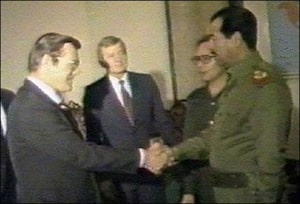
One maddening feature of foreign policy debates in the United States is how frequently journalists and policy experts fail to challenge dominant narratives even when those narratives have glaring defects. Such malfeasance has facilitated a growing list of Washington’s policy blunders and outright debacles. Yet the tendency to accept the US government’s version of the issues at stake in any new crisis appears to be getting worse rather than better.
An examination of developments just during the post-Cold War era reveals a disturbing number of surprising and worrisome examples. In the prelude to the Persian Gulf War in 1991, George H. W. Bush’s administration insisted that Iraq’s military was an extremely capable, powerful force that posed a threat to the entire Middle East and perhaps beyond. Even modestly skeptical analysts should have raised questions about that assertion. After all, Iraq had waged a draining, 8-year-long war against Iran in the 1980s that ended in a stalemate.
That surprising outcome occurred even though Iraq had multiple, significant advantages going into that conflict. Iran was in turmoil following the Islamic Revolution in 1979. The military’s corps of officers had been devastated, caused by a wave of defections to the West and a purge of officers and even some senior enlisted personnel who were deemed insufficiently loyal to the new government. The seizure of US diplomats in Tehran also led to the imposition of sanctions, which not only damaged Iran’s economy, but prevented the military from getting spare parts for critical weapons systems or handling important maintenance functions.
In addition, the United States and several Arab powers covertly provided weapons and other assistance to Iraq even during the earliest stages of the war. That assistance gradually increased as the conflict continued, and it went far beyond the transfer of weaponry. The “reflagging” of Iraqi oil tankers under the flag of Kuwait to prevent Iranian attacks was one of many examples of such expanded assistance.
Despite all of those advantages, Saddam Hussein’s regime failed to achieve its territorial goals with respect to Iran. Yet in 1991 the Bush White House still insisted that the lumbering, bloodied Iraqi military was a juggernaut capable of posing a regional and perhaps an extra-regional security threat. Very few journalists or policy experts challenged that extremely dubious assertion.
A similar lack of curiosity was evident with respect to Bosnia’s civil war later in the 1990s. Bill Clinton’s administration and its allies in the news media and policy communities portrayed the conflict as a stark, two-way struggle between utterly evil Serbs and innocent Muslim victims. Yet some of the most vicious fighting took place between Muslim and Croat forces. The battle for Mostar, and the resulting destruction of that city’s famous sixteenth century bridge (a UNESCO World Heritage Site), was merely one example. However, the number of news stories or policy analyses about that aspect of the Bosnian war was meager. The number of accounts that challenged the administration’s simplistic portrayal of the Muslim-Serb phase of the war as a morality play featuring a stark struggle between good and evil was fewer still.
The quality of analysis did not improve with the arrival of the new millennium. In the lead up to the US-led invasion of Iraq in 2003, George W. Bush’s foreign policy team pushed the twin narratives that Saddam’s regime was building an arsenal of weapons of mass destruction and that Baghdad had been involved in the 9-11 terrorist attacks on the World Trade Center and the Pentagon. Both allegations were extremely shaky at the time and they ultimately were thoroughly debunked. However, that development did not occur until it was apparent that Washington’s military adventure had become a debacle. During the crucial months before the war, leading journalistic outlets (especially the New York Times and Washington Post) not only failed to challenge the pro-intervention narrative and ask penetrating questions of officials, they and the foreign policy blob were reliable conduits of administration-generated propaganda.
A similar willingness to placidly accept the Biden administration’s narrative about the Russia-Ukraine war is all-too-evident. Only a few analysts have disputed the administration’s contention that Russia’s February 2022 invasion of Ukraine was entirely unprovoked. Skeptics who pointed out that NATO’s eastward expansion to Russia’s border (despite the Kremlin’s repeated warnings about “red lines”) was a provocation that made war likely were drowned out in the deluge of sycophantic accounts echoing the administration’s position.
That unwillingness to challenge Washington’s narrative was evident even when the US case barely passed the laugh test. One example was the blind acceptance of the notion that Russia sabotaged its own Nord Stream natural gas pipeline. Even the most basic assessment should have raised major questions about that scenario. With respect to both opportunity and motive (especially the latter) Russia should have been far down on the list of suspects, not at the top. Conversely, the United States and such key NATO allies as Britain and Norway should have been prime suspects.
Independent analysts need to develop a greater understanding of what the term “independent” really means. Such a status requires questioning even the best-supported government narratives. It certainly should entail a willingness to explicitly challenge dubious, poorly supported, and internally contradictory narratives. Most members of the American foreign policy and journalistic communities repeatedly have failed to meet that basic standard.
Reprinted with permission from Antiwar.com.

